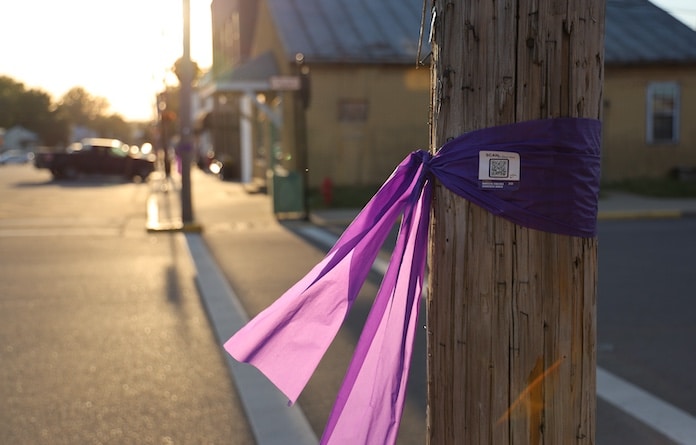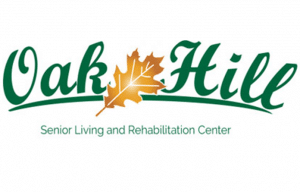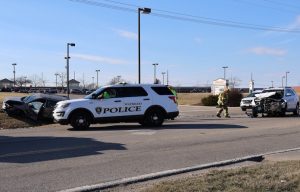Curbing domestic violence

Folks visiting downtown Waterloo and other spots around the county might notice purple ribbons wrapped around light poles or other fixtures along the street.
These ribbons are meant as a symbol of Domestic Violence Awareness Month, with October serving as a time to really spread the word about the pain such victims experience and what can be done to help them.
One organization offering vital resources to combat and solve domestic violence is the Violence Prevention Center of Southwestern Illinois, which is based in Belleville and serves St. Clair, Monroe and Randolph counties.
VPC Director of Development Melissa Tutterow spoke about the work the organization does for the area.
Getting its start in 1974, the VPC expanded its services to Monroe and Randolph counties in 1996 and 1997 with the ultimate goal of supporting survivors of domestic abuse.
“We serve survivors and support their journey,” Tutterow said. “All of our services are voluntary. We follow what the survivor wants to do. They create their own path, and we just support them through it, whatever that might be.”
This is done through four main programs, including the 24-hour crisis hotline which can be reached by calling 618-235-0892.
Tutterow explained that the number is always available for folks looking for the organization’s resources or simply looking to have some questions answered.
“That really is an entry point for most of our clients,” Tutterow said. “They call, maybe they’re not sure if what they’re experiencing is abuse, or maybe it’s a loved one calling the hotline, wanting to know how they can help their friend, family, co-worker.”
The VPC also has an emergency shelter with 35 beds, allowing victims and their dependent children a space to rest and collect themselves away from their abusive environment.
Tutterow added that folks have the opportunity to work with a case manager to discuss and work through their situation. She placed emphasis on how the shelter provides time and space to those who are homeless due to domestic violence.
Counseling services are also available through the VPC for youth and any victims of abuse to help folks deal with the trauma of domestic violence.
She noted how, for especially young kids who have been victims of abuse, the VPC’s counseling services place special emphasis on building social skills in an effort to break the cycle of abuse.
The VPC also offers legal advocacy, with full-time advocate at the courthouses in Waterloo and Chester as well as several advocates in St. Clair County.
Alongside all of these programs, the organization also works to advocate for change and prevention, particularly working with schools in the area to provide materials that are age-appropriate for a range of youths.
Work is also done with a variety of other organizations and groups.
“One of our main roles is to, hopefully, stop the cycle of violence, to educate the community, our social service workers, teachers, police on how to identify domestic violence, how to treat survivors with dignity, how to approach them in ways that actually lead them to help,” Tutterow said.
One individual working in the area of advocacy and prevention is Waterloo local Kay Clements, who serves as a community volunteer on the organization’s board.
Clements began working with the VPC in 2000, driven primarily thanks to her own experience with domestic abuse and the impact it had on her family.
As part of her advocacy, she’s long spoken about her oldest daughter who was killed by her boyfriend in 1992, back when they lived in Omaha, Neb.
Clements recounted how her daughter was abused throughout high school and shortly after graduating, with her boyfriend isolating her from her friends, kicking her from under the table during lunch to control how she ate and further abusing her in such a way that Clements described it as a “textbook example” of abuse that she tragically didn’t know about until it was too late.
As the family moved to Waterloo in 1993 and she started working at the high school soon after, she recognized that folks in the area had the same lack of awareness regarding abuse that had pushed her to advocate back in Nebraska.
“I noticed the same thing here as was going on in Omaha, nobody in high school knew anything about dating violence,” Clements said. “So I started talking at schools. I started in Omaha, talking in schools there about signs to look for and stuff like that.”
She quickly joined the board as a previous local left an opening for her, and her work has continued ever since as she’s placed a particular focus on her new home in Monroe County.
Her talks at local schools continued, and she also began putting together events and other efforts such as an October walk from St. Paul UCC to the courthouse bandstand, concluding in a discussion about domestic violence.
“I still have kids that come up and tell me that I helped them not get into that kind of a relationship because I gave them the things to look for,” Clements said.
The hanging of the purple ribbons began more recently, in the past five or six years, serving as a simple way of exposing people to Domestic Violence Awareness Month.
Clements noted that this year’s ribbons – decorating Waterloo, Columbia, Hecker, Valmeyer, Maeystown and Millstadt – are also paired with stickers featuring a QR code and a web URL guiding folks to the VPC.
“I’ve had people stop me on the street and say, ‘Why are you hanging those purple ribbons?’” Clements said. “And, you know, it’s a good way to get knowledge out there.”
Along with discussing her history of advocacy, Clements also shared her knowledge on domestic violence and abuse today.
She noted that the current awareness of abuse is far better in high schools today compared to the past. She recalled her talks in P.E. classes that moved to health classes, and now health classes often have their own lessons on abuse.
Clements remarked that control is perhaps the biggest aspect of abuse, with someone suffering from violence having their behaviors, communication and other major aspects of their life forcibly controlled by someone else.
She noted that abuse like this isn’t purely physical, with name-calling and other ridicule meant to hurt someone’s confidence having a terrible impact.
“You don’t have to have bruises all over your body to be abused,” Clements said. “People don’t realize the mental and the verbal abuse of victims is horrible. It’s so controlling.”
She also mentioned how additional avenues for abuse exist today that weren’t around in the past.
With smart phones and the internet, abusers now have the ability to directly track their victims or invade their privacy.
“There’s so many different kinds of abuse, and technology really brought it to a different level because now kids can keep track of their victims 24/7,” Clements said. “They know exactly where they are, what they’re doing, they can get on their phones and see who they’re talking to, all kinds of things.”
Clements pointed to the VPC’s crisis hotline as a vital resource for folks seeking assistance.
Tutterow likewise encouraged individuals in an abusive relationship or questioning whether they’re in one to reach out.
“I would say folks need to reach out when their gut is telling them that something might be wrong, and that can be really early or it can be later in their journey,” Tutterow said. “The reality is they don’t have to be ready to leave. They don’t have to be ready to move forward. They can just give us a call, have some questions answered or maybe see a counselor for a session or two and talk through it. And maybe they won’t be ready to leave then, maybe they won’t ever be ready to leave, but at least they’ll know. They’ll be empowered with good information to make their own decision.”
Regarding support for the VPC and survivors of domestic violence, Tutterow noted that the organization is often looking for help, such as with a cleaning day scheduled for Oct. 18.
Those looking to offer assistance for VPC can do so by contacting their office number at 618-236-2531 or emailing info@vpcswi.org.
Of course, the most important form of support many can provide for victims of domestic violence is sharing and providing access to the resources they need, such as the VPC crisis hotline which can be reached at 618-235-0892.
As Tutterow said, “Survivors don’t get help when they don’t know help exists.”






